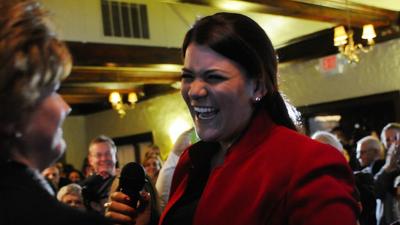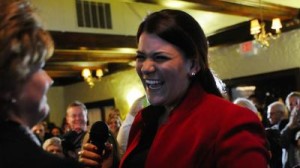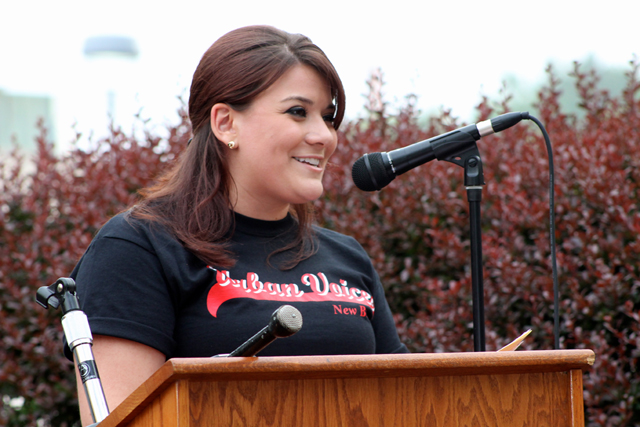A powerful African American state senator, the 26-year-old daughter of a former mayor, a dentist, a paralegal and a social worker who counsels hospice patients.
Together, this diverse group of women — Republicans and Democrats, veterans and newcomers, boomers and millennials — is challenging entrenched assumptions while swelling the ranks of female municipal leaders in the state.
The five — Toni Harp, 66, of New Haven; Erin Stewart, 26, of New Britain; Anita Dugatto, 55, of Derby; Elinor Carbone, 56, of Torrington; and Deb Hinchey, 61, of Norwich — were each elected mayor of their city on Tuesday, part of a small wave of female candidates for local office who made big strides in Connecticut and New York.
“Women are not monolithic,” said Teresa C. Younger, executive director of the Permanent Commission on the Status of Women, which was established by the legislature 40 years ago to eliminate gender discrimination in Connecticut. “They are coming not just from different educational and political backgrounds, but different life experiences that will help them lead their communities and lead the state.”
Although women have achieved enormous political triumphs in Connecticut and throughout the nation, they still lag behind their male counterparts. According to a January survey by the Center for American Women and Politics at Rutgers University, just 17.4 percent of U.S. cities with populations greater than 30,000 were led by women. And among Connecticut cities of that size, according to the center, before Tuesday’s voting only East Hartford, with a population of about 50,000, had a female mayor: Democrat Marcia Leclerc, who handily won re-election and was the top vote-getter overall.
On Wednesday, newly elected female mayors from both parties celebrated their role in expanding the number of Connecticut’s female municipal CEOs.
“We broke a lot of barriers last night,” Stewart, a Republican, said Wednesday afternoon, a day after solidly trouncing New Britain’s Democratic Mayor, Tim O’Brien. “I’m not only the youngest mayor New Britain has ever elected, but I’m also the second female mayor. I’m really proud of that.”
Since Linda Blogoslawski left office 18 years ago, mayors in New Britain have sometimes been Republican, sometimes Democrat — but always middle-aged and male. Stewart said she brought something “new and different” to the campaign.
“I’m a different kind of candidate — some people may think a mayor needs to be gray-haired and a man, but I’m long-red-haired and a woman. Somebody looking at my [campaign] flier thinks, ‘This girl is running for mayor? Let’s see what she’s about,”’ Stewart said.
Stewart’s father, Tim Stewart, also served as New Britain’s mayor. Her campaign tag line — “a new generation of leadership” — is a nod to her father’s service but it also reflects her goal of spurring greater civic engagement with the residents of this gritty city, where Democrats hold a decisive edge in voter registration.
“Hopefully, we’ll bring in a lot more young families,” Stewart said. “We’ve really changed the face of New Britain.”
Stewart is seen as a rock star by the state Republican Party, which launched an organized effort to win over female voters after struggling to connect with them in recent elections.
Elissa Voccola, the executive director of the Connecticut Republican Party, said that GOP leaders plan to highlight the wins of Stewart and Carbone, the mayor-elect in Torrington.
“As we ramp up our efforts to reach out to female voters across the state, we are very fortunate to have Republican women like Erin and Elinor, whose successes serve as an inspiration to all,” Voccola said.
In New Haven, the state’s second-largest city, with a population of 130,741, Democratic state Sen. Toni Harp will be the city’s first female mayor. She called her win history-making and, at the start of her victory speech Tuesday night, she asked her happy supporters to listen closely.
“That is the sound of a glass ceiling shattering,” Harp told the crowd.
Unlike Harp, Democrat Deb Hinchey, the newly elected mayor of Norwich, doesn’t have a long political resume. A licensed clinical social worker, she has served on the city council since 2009.
Hinchey, who identifies herself as a feminist, said that her professional training as well as her gender give her a different perspective on politics.
“Being a woman as well as a social worker brings the skills of compromise, negotiation, looking at people’s strengths,” Hinchey said. “Women tend to be more inclusive.”
EMILY’s List has annointed 2013 “the year of the woman mayor.” The group, which recruits and funds female Democratic candidates who back abortion rights, cited wins by female candidates in numerous cities, including Albany, Syracuse and Rochester, N.Y.
Marcy Stech, EMILY’s List’s national press secretary, said the group’s research shows that voters view women as less sharply partisan than male candidates, a trait that can provide an edge in an age when political bickering dominates much of the national discourse.
Of course, Connecticut has a storied tradition of supporting female political candidates, which dates to well before Ella Grasso became the nation’s first female elected governor in 1974. Greenwich Sen. Florence Finney became the first woman president pro tempore of the state Senate in 1973. An even earlier pioneer was Claire Booth Luce of Greenwich, elected to the U.S. House of Representatives in 1942.
But the current crop of female elected officials is forging new ground. In some cases, these women are sidestepping the traditional route to higher office — which, for many female candidates, often starts with a run for the school board when their children are young.
That was the route taken by Lt. Gov. Nancy Wyman. After serving on the school board and in the legislature, she decided to run for state comptroller.
“Some of the big boys in the backroom thought, ‘She’s not supposed to be running for this position,'” recalled Wyman, a Democrat. Among the questions raised: How could a woman take care of the money?
Wyman said she was thrilled by the election of five new female mayors. She estimated that the state had at least 20 first selectwomen, town council chairmen and mayors.
But the sexism that Wyman encountered in her first statewide run in the early 1990s is still there. Female candidates are often asked how they will balance their political careers with their family life, a question rarely posed to men.
“We know how to handle our schedules,” Wyman said. “We’ve been juggling things for years, anyway.”
—
This article originally appeared in the Hartford Courant.




